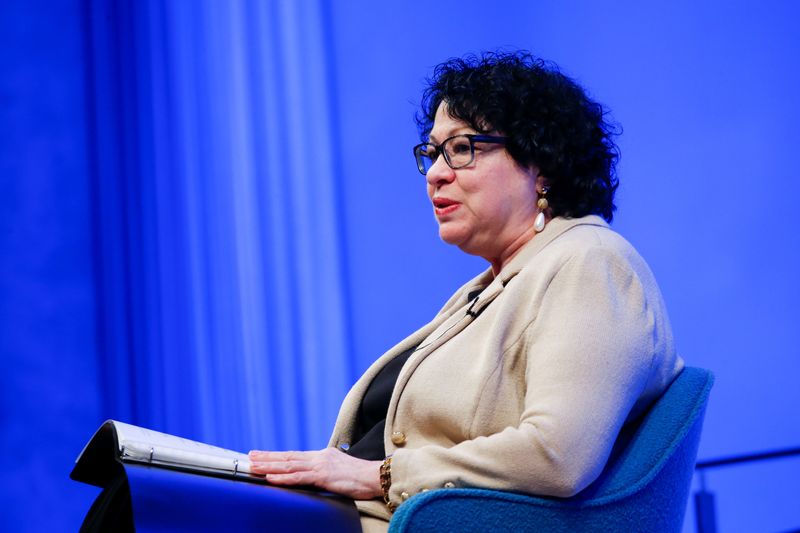Investing.com’s stocks of the week
By Karen Sloan
SAN DIEGO (Reuters) - Liberal Justice Sonia Sotomayor on Wednesday told legal educators she felt a "sense of despair" at the direction taken by the U.S. Supreme Court during its previous term, during which its conservative majority overturned the constitutional right to abortion.
Sotomayor, who has dissented in major cases including the abortion decision as the court's 6-3 conservative majority has become increasingly assertive, described herself as "shell-shocked" and "deeply sad" after that term ended in June.
"I did have a sense of despair about the direction my court was going," Sotomayor said, appearing by video feed before hundreds of law professors at the Association of American Law Schools' annual meeting in San Diego.
The court on June 24 overturned the landmark 1973 Roe v. Wade decision that had legalized abortion nationwide after one day earlier delivering an important ruling expanding gun rights.
During her hourlong conversation with University of California, Berkeley School of Law Dean Erwin Chemerinsky, Sotomayor did not mention by name the abortion ruling, called Dobbs v. Jackson Women's Health Organization. Nor did she discuss the May leak of a draft version of that decision before it was officially released the following month.
In the Dobbs ruling, the court voted 6-3 along ideological lines to uphold a Republican-backed Mississippi law that bans abortion after 15 weeks of pregnancy and 5-4 to overturn Roe.
Sotomayor said she would continue to "tilt at windmills" and write dissents even though the court has moved steadily to the right.
"It's not an option to fall into despair," Sotomayor said. "I have to get up and keep fighting."
The conservative justices have shown an increasing willingness to take on divisive issues and steer the court on a rightward path.
The court's current term, which began in October, could be just as consequential as its previous one. Potential rulings could end affirmative action policies used by colleges and universities to increase enrollment of Black and Hispanic students, hobble a federal law called the Voting Rights Act and make it easier for businesses to refuse service to LGBT people based on free-speech rights.
The addition of three justices appointed by Republican former President Donald Trump - Neil Gorsuch in 2017, Brett Kavanaugh in 2018 and Amy Coney Barrett in 2020 - gave the court its current conservative super-majority.
Sotomayor's comments come after months of public statements by justices indicating an ongoing debate over the direction and legitimacy of the court as an institution. Polls show that the court's public approval has reached record lows.
Liberal Justice Elena Kagan in September said that the court's legitimacy could be imperiled if Americans come to view its members as trying to impose personal preferences on society. In October, conservative Justice Samuel Alito, who authored the Dobbs opinion, warned against questioning the court's integrity.
At Wednesday's conference, Chemerinsky noted that he had never before seen his law students so discouraged about the Supreme Court. Sotomayor responded that there is value in lawyers fighting for those who have been wronged even if they do not ultimately prevail.
Sotomayor, appointed to the court by Democratic former President Barack Obama in 2009, expressed optimism that the direction of the court will change in the future.
"It may take time but I believe we will get back on the right track," Sotomayor added.
